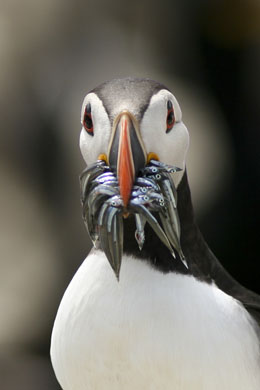Fishing should be halved to save protected species find St Andrews researchers

Fishing for prey species such as herring and anchovies should be cut in half globally to protect creatures that eat them, such as puffins, whales and penguins, according to new research from the University of St Andrews.
A team of international experts, which includes Professor Ian Boyd of the University of St Andrews Sea Mammal Research Unit, warns that the increasing use of herring and anchovies to feed farmed fish, pigs, chickens and as nutritional supplements for humans is putting wild species that rely on them at risk.
The Lenfest Forage Fish Task Force carried out the most comprehensive analysis of the science of “forage fish” populations to date.
Its report, Little Fish, Big Impact: Managing a crucial link in ocean food webs, published today, concluded that in most ecosystems at least twice as many of these species should be left in the ocean as conventional practice.
As the fish are key food sources for commercially valuable fish such as salmon, tuna, bass and cod, the task force estimated they were twice as valuable in the water as they were if they were caught.
Using modelling, they calculated that forage fish contribute £7 billion by serving as food for other commercially important fish, compared with £3.5bn they generated as direct catch.
Professor Ian Boyd, director of the Sea Mammal Research Unit said: “Our analysis found that the best way generally to ensure there’s enough food for dependent predators is to reduce fishing for their prey.
“We need to start to understand that leaving some types of fish in the water in greater numbers is not just good for ecosystems, but it is good economics too.”
The Lenfest Forage Fish Task Force, made up of 13 scientists, was established to generate advice to support better management of forage fish around the world.
It highlights that a thriving marine ecosystem relies on plenty of forage fish, which are a crucial link in the food chain.
They eat plankton and are preyed upon by animals such as penguins, whales, seals, puffins and dolphins.
However, they are also in increasing demand for use as fish meal to feed farmed fish, pigs and chickens. They are also used to produce omega 3 oils, used in food supplements for humans.
Issued by the Press Office, University of St Andrews
Contact Fiona MacLeod on 01334 462108 / 0771 414 0559.
Ref: (fish 02/04/12)
View the University’s latest news at http://www.st-andrews.ac.uk/news/
Category Research